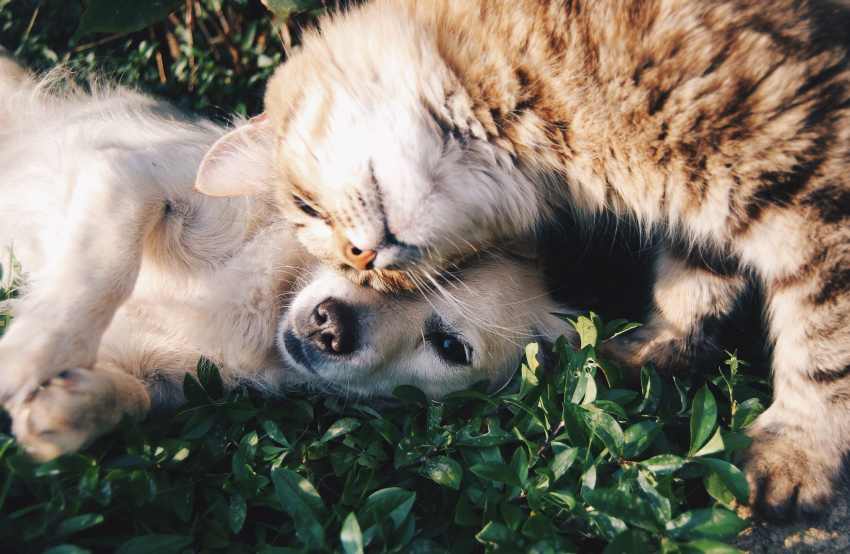In the age-old debate of cats versus dogs, there’s a common misconception that these two furry companions can never get along. While it’s true that some dog breeds may have a stronger prey drive or territorial instincts, there are plenty of breeds that not only tolerate but genuinely enjoy the company of their feline counterparts.
In this blog post, we explore the harmony between different species and delve into the fascinating world of dog breeds that are feline-friendly companions.
The Laid-Back Labrador Retriever:
Labrador Retrievers are renowned for their friendly and easygoing nature. These sociable dogs tend to get along well with various animals, including cats. Labs are often described as reliable family dogs, and their gentle demeanor makes them ideal companions for households with both dogs and cats. Their adaptable and patient temperament makes them less likely to see a cat as a potential threat.
Basset Hounds: Gentle Giants with a Soft Spot for Felines:
Basset Hounds may be known for their long ears and distinctive appearance, but underneath that exterior lies a gentle giant with a soft spot for feline friends. Bassets are generally good-natured and low-energy, making them less likely to engage in chasing behaviors. Their laid-back attitude can create a harmonious environment for cohabiting with cats.
The Easygoing Cavalier King Charles Spaniel:
Cavalier King Charles Spaniels are not only charming and affectionate but are also known for their adaptable nature. These small-sized dogs are generally friendly and enjoy forming close bonds with their human and feline companions alike. The Cavalier’s social disposition often makes them more than willing to share their space with a cat, fostering a peaceful living arrangement.
Beagle: A Sociable Sniffer with a Cat-Friendly Attitude:
Beagles, known for their exceptional sense of smell and friendly demeanor, can make excellent cat companions. Their inquisitive nature may lead them to investigate new scents, but their generally friendly disposition makes them unlikely to pose a threat to feline housemates. With proper introductions and supervision, Beagles and cats can coexist harmoniously.
The Adaptable Golden Retriever:
Golden Retrievers, renowned for their intelligence and loyalty, are often considered one of the most adaptable dog breeds. Their friendly and tolerant nature extends to interactions with cats, making them a popular choice for families with both canine and feline members. Golden Retrievers thrive on positive social interactions, making them more likely to embrace a new feline friend.
Poodle: Intelligent and Social Butterflies:
Poodles, available in standard, miniature, and toy sizes, are known for their intelligence and hypoallergenic coats. These versatile dogs often form strong bonds with their human and feline companions. Poodles’ social nature and adaptability contribute to their ability to live harmoniously with cats, provided they are introduced and socialized correctly.
In summary, while some dog breeds may have a reputation for being less cat-friendly, it’s essential to remember that individual temperament, socialization, and proper introductions play crucial roles in fostering positive relationships between dogs and cats.
The breeds mentioned above are just a few examples of dogs that tend to befriend their feline housemates. Ultimately, successful cohabitation depends on the unique personalities of both animals and the efforts of their human caregivers to create a peaceful and loving home for everyone involved.

Dogs That Generally Don’t Make Good Feline-Friendly Companions
While generalizations about specific dog breeds can be challenging, as individual temperament varies widely, certain breeds may have characteristics that make them less likely to get along with cats.
Additionally, a dog’s upbringing, training, and socialization play significant roles in determining its behavior toward other animals. Here are some factors that may contribute to a dog’s difficulty in getting along with cats:
High Prey Drive:
Breeds historically developed for hunting or herding may have a strong prey drive. These dogs may be more inclined to chase or exhibit predatory behavior toward smaller animals, including cats. Examples include Greyhounds, Whippets, and certain terrier breeds.
Territorial Instincts:
Some breeds are known for being territorial, which can lead to aggression or intolerance towards other animals invading their space. Breeds like Akitas, Chow Chows, and Shar-Peis may exhibit more territorial behavior.
Lack of Socialization:
Dogs that have not been adequately socialized with cats during their critical developmental periods may be less likely to accept them as companions. Early positive exposure to different animals and environments is crucial for shaping a dog’s behavior.
Guardian Breeds:
Breeds developed for guarding and protection, such as the Anatolian Shepherd or Kuvasz, may have a strong instinct to guard their territory. This protective nature can make them less tolerant of other animals, including cats.
Individual Personality:
Even within a breed, dogs can have varying levels of tolerance and sociability. A dog’s personality, experiences, and training can significantly impact its ability to get along with cats.
It’s important to note that with proper training, socialization, and careful introductions, many dogs can learn to coexist peacefully with cats. Additionally, mixed-breed dogs may not exhibit breed-specific characteristics as strongly as purebred dogs.
Ultimately, when considering bringing a dog into a household with cats, it’s crucial to assess the dog’s behavior, ensure a gradual introduction, and provide ongoing supervision to prevent potential conflicts. Consulting with a professional dog trainer or behaviorist can also be beneficial in addressing specific concerns related to introducing a new dog to a household with cats.
Related article:
Dogs and Babies | How to Introduce a Dog to Your Baby
Recent Posts
Summer Safety Guide for Dog Owners: Keeping Your Canine Companion Cool and Comfortable
Summer brings warmth and sunshine, inviting humans and their canine companions to enjoy the outdoors. However, the rise in temperature also increases the risks of overheating and heat-related...
The Importance of Heat Safety for Dogs: Understanding Heatstroke and How to Prevent It
Heatstroke is a serious condition that can occur in dogs when their body temperature becomes dangerously high, typically as a result of prolonged exposure to high temperatures or excessive physical...


